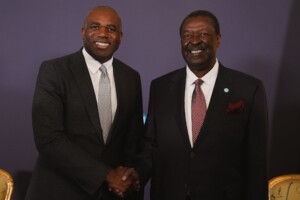Team Zamzam: Residents overcome sexual violence stigma in North Darfur
Team Zamzam, a group of 16 women who provide counselling to victims of sexual violence in Zamzam Camp, 15km south of El Fasher, is expanding its reach. Niemat describes their trip to Um Hashaba and Shangil Tobaya, rural areas that are “far from fully secure,” as “very worrying”.
 Team Zamzam (Eric Reeves)
Team Zamzam (Eric Reeves)
“This girl is so remarkably brave. She didn’t hesitate to tell us about three crazed Janjaweed who assaulted her for hours before stabbing her,” writes the coordinating councillor of Team Zamzam, Niemat*, after a visit to a village near Um Hashaba in North Darfur.
Team Zamzam, a group of 16 women who provide counselling to victims of sexual violence in Zamzam Camp, 15 kilometres south of El Fasher, is expanding its reach. Niemat describes their trip to Um Hashaba and Shangil Tobaya, rural areas that are “far from fully secure,” as “very worrying”.
On April 21, three of the team met Magbola, who is suffering from severe pain in her vaginal area after being assaulted last year by the Arab militia. “Her condition made us all cry. Her family couldn’t afford to take her to the hospital in El Fasher because she is without a father and her mother had no way of providing for their daily needs,” says Niemat.
Cochair of the project, respected Sudan analyst Prof Eric Reeves, who is a former Senior Fellow at Harvard University’s François-Xavier Bagnoud Center for Health and Human Rights, explains that with “modest resources” they have provided counselling to more than 1,000 girls and women since September, especially those most seriously traumatised by sexual violence. A large part of the project is assisting women who suffer from urinary fistulas** to gain access to the surgical clinic in El Fasher for treatment.

Victims of this sexual violence live with chronic incontinence and pain, along with an increased risk of unwanted pregnancy and sexually transmitted infections, including HIV/AIDs. They must also live with the psychological trauma and stigma of rape.
According to Gaffar Mohamed Saneen, cochair of the project, the assertion that rape and sexual violence are the most likely cause of urinary fistulas is “largely denied by camp society, which in many cases has made the victims the objects of lies and slander.” As a result, there are likely many silent victims of fistulas in the camp, he says.
Medical treatment
Surgical treatment of this traumatic gynaecologic fistula in Darfur is urgently needed by a vast number of women, although no census is possible. Fistula surgery at the El Fasher clinic can cost up to $400. In addition, the patient will need considerable assistance before and after the surgery.
“Sadly, the waiting list is very long, and growing, and [Team Zamzam] counsellors have the unenviable task of establishing priority,” says Eric.
The waiting period for fistula treatment may be several months if the patient cannot fund the surgery themselves, which is the case “for the vast majority of the patients in Darfur, especially women,” says Gaffar.

In May 2017, Dr Saleh El Taher told Radio Dabanga that a lack of material resources, medical devices, and equipment, was preventing fistula operations from being carried out on a waiting list of 24 people who required surgery at El Fasher hospital in North Darfur.
Last week, the suspension of the Sudanese NGO Anhar Organisation for Peace in North Darfur triggered protests among displaced people in the region. North Darfur community leaders denounced “the erroneous decision of the committee,” which caused the closure of 16 health centres in camps for the displaced in Kabkabiya, Saraf Omra, and El Fasher localities.
According to Gaffar, the closure of the organisation brings “nothing but more misery”. Almost 98 per cent of the inhabitants of IDP camps in Darfur rely on NGOs for their health and wellbeing.
Sexual violence stigma
Halima, a resident of Zamzam camp, who was kidnapped by Arab militia and sexually assaulted for two days, says, “I didn’t want to talk about what happened to me to anyone until the sisters from Team Zamzam came to encourage me to be strong”.
She was in pain for many weeks following the incident last year, and still feels pain sometimes. It is not clear what causes the pain.
The kidnappers “released me and threatened me, telling me not to say anything to anyone, otherwise my family would be subjected to murder. For those days I didn’t know what was happening to me.” She has been in counselling for two months and now feels stronger and happier. “Sisters from Team Zamzam helped me and I will never forget them,” she says.

“At the beginning, we thought this medical problem only existed in the IDP camps, but eventually we learned that there are as many victims as one could imagine in the rural areas where people live in small farming communities,” says Niemat.
Sexual violence remains a prevalent issue throughout the country, highlighted continuously by women’s rights organisations such as the Sudanese Women’s Revolution Initiative. The Thomson Reuters Foundation ranks Sudan as one of the worst countries worldwide for women’s rights.
Radio Dabanga has previously reported on the use of systematic rape as a weapon of war and political repression in Sudan, including the mass rape of women and girls by government forces on 31 October, 2014 in Tabit in North Darfur.
Counselling
Niemat says that the Team “can confidently say that we have been able to break the psychological barrier that resulted from stigma and social isolation” in Zamzam camp.
After a very difficult start, the psychological state of victims of sexual assault is improving steadily, with more victims approaching the counsellors every day. This has been aided by women and girls bringing their friends to sessions.
“This noble task has changed our lives, planted more fresh confidence in our abilities and most importantly is enabling us to work as women, to participate in social activities, and contribute to improving the psychological wellbeing of the forgotten victims – too long ignored by a male-dominated society, which ignores the harsh reality of sexual violence,” says Niemat.
She says the project has “brought happiness, joy, and reassurance to those who were on the verge of psychological breakdown.” However, the extent and magnitude of suffering is still deep and may take years to repair.
Each counsellor is paid $100 per month, and two security personnel are paid $100 per month, which includes car services for women travelling to El Fasher for treatment. The project is largely funded by Eric Reeves and donations.
Training
Many if not most girls and women return for counselling sessions, either for an individual session or a group session: “Some victims are so moved by their own experience that they serve as volunteers and help break the ice by accompanying friends who are also victims to sessions,” says Eric.
Sadig* approached Team Zamzam in March to thank them for helping his daughter who has been suffering from suicidal thoughts and depression after being tied up by camel herders as a child. According to the Team, he broke down in tears, saying: “I have nothing to offer you for helping my daughter, but I have asked her to come here every day to help you and to help herself to be strong.”

There were originally eight counsellors who undertook a two-week training course run by two women who were professionals with experience treating and responding to sexual violence in September.
Since then, those eight counsellors have trained eight new counsellors. The chairs of the project hope that a new grant could provide funding for an extra 14 counsellors, along with another person to provide security. The new personnel would be trained by the current Team Zamzam.
Given the uptick of violence in North Darfur and the wider region, the project is also funding another two-week course for two of the counsellors on how to improve security for their work. They will, in turn, instruct those who are working outside Zamzam camp.
‘Devils on horseback’
At the height of the violence in Darfur from 2003 to 2005, the Janjaweed were the primary perpetrators of brutal attacks on non-Arab civilians, particularly those from the Fur, Masalit, and Zaghawa communities. The International Criminal Court (ICC) traced these attacks to the highest levels of Sudan’s government, eventually issuing an arrest warrant indicting President Omar Al Bashir for genocide.
The UN Security Council mandated that the Sudanese government disarm its Janjaweed militias, who earned global infamy as ‘devils on horseback’ a decade ago.
The Rapid Support Forces grew out of the Janjaweed militia, widely believed to be responsible for atrocities in the Kordofan and Darfur regions since its inception. They are also held responsible for the violent break-up of the Khartoum sit-in on June 3, 2019.

In the Constitutional Document, signed on August 2019 by the then ruling Transitional Military Council and the opposition Forces for Freedom and Change, it was agreed that the RSF were to be integrated into the Sudan Armed Forces (SAF) in August last year. At the same time, however, the militia would stay a force unto itself, commanded by Mohamed Hamdan ‘Hemeti’, who was sworn in as deputy president of Sudan’s Sovereign Council following the August 21, 2019 Constitutional Declaration.
Sudanese Prime Minister Abdallah Hamdok said that refugees and displaced people should take part in Sudan’s peace-building process after visiting Zamzam camp in November 2019. He also vowed to achieve transitional justice in the war-torn region.
After RSF ‘Peace Shield Forces’ were deployed in certain localities in North Darfur in February to deal with a severe lack of security, numerous protests demanding their withdrawal took place. Combatants of rebel movements are not represented in these joint forces.
Bleak outlook
The mainstream Sudan Liberation Movement under the leadership of Abdelwahid El Nur (SLM-AW) has refused to negotiate with the government in a formal peace process until security and stability have been realised in Sudan’s conflict-torn western region.
In March this year, the government of North Darfur announced a “well-prepared plan” to protect civilians, including using the premises and belongings left behind by the outgoing United Nations-African Union Mission in Darfur (UNAMID).
“The future of Sudan looks bleak for the meantime and the possibility of a violence spiral remains higher than ever,” says Gaffar. “As now we are approaching rainy season in Sudan, worry has returned to Darfur.”
“The violence in general and sexual violence could be easily stopped if there were political will from the government,” according to Gaffar, however, “they are very much preoccupied with issues of factional rivalry conflict.”
On Monday, Niemat reported that even though people celebrated the feast of Eid, they are anticipating that planting season is due in less than three weeks. Ramadan has made it especially difficult to make trips outside of Zamzam camp, but she hopes to continue to extend the Team’s counselling expertise to women like Magbola as soon as possible.
* Names have been changed to protect identities.
** What is a fistula?
A fistula is an abnormal connection or passageway between two organs or body cavities that do not usually connect. A urinary fistula is an abnormal passage between the bladder and the vagina and between the rectum and the vagina. In most countries in Africa, the most common cause of fistulas is childbirth or sexual violence, most conspicuously in the form of rape, gang rape, and the insertion of sharp objects into the vagina or rectum.











 and then
and then